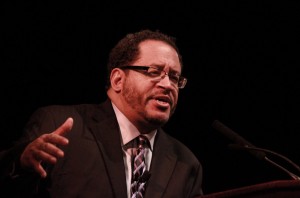
Robin Wang, Staff Photographer
In a speech reminiscent of a rousing gospel sermon, political analyst and Georgetown University sociology professor Michael Eric Dyson galvanized the audience to remember King’s legacy and seek social change at a well-attended Martin Luther King, Jr. Commemorative Address on Friday, Jan. 27.
Dyson is a prolific author who has written and lectured extensively on the impact of King’s death, Malcolm X and popular music in America, among other topics. Dyson grew up in Michigan and became an ordained Baptist minister at the age of 19 before eventually completing his master’s and doctorate in religion at Princeton University.
Dyson has served as a political analyst for MSNBC since July 2011 and previously hosted a radio show and was a commentator on National Public Radio and CNN.
In a press conference prior to the address, Dyson highlighted the importance of Black History Month, in February, and the impact that King’s death had on him personally, explaining that it made him vulnerable.
“It scared the heck out of me,” Dyson said. “He was a powerful black man and I was a black man in the ghetto of Detroit.”
Dyson also said that the 1967 race riots in Detroit, which raged uncomfortably close to home when he was only eight years old, served as a “traumatic introduction” to racial separation in the U.S.
Living in Detroit, Dyson managed to escape the negative influence of gang members and his surrounding peers after meeting his pastor, who allowed him to get in touch with his moral values and gave him a sense of his importance as a thinker, he said.
The College Diversity Roundtable, which co-sponsors the event with the Office of the President each year, has selected a wide array of speakers for the annual address, from poets to activists.
Director of Minority Student Affairs Norman Burnett said that the MLK Commemorative Address Planning Committee considered a large number of speakers before settling on Dyson, who they believed could deliver a message that resonated with both students and the Rochester community. And, Burnett believes, Dyson lived up to these expectations.
“His talk expertly incorporated the historical work and vision of Dr. King with contemporary cultural issues,” Burnett said. “Moreover, his talk somehow combined all the finest elements of a scholar, preacher and hip-hop artist.”
College Diversity Roundtable member and sophomore Alisa Jimenez introduced Dyson.
“His list of accomplishments continues to grow along with his influence,” Jimenez said. “As students, he has felt our stress, he has felt our joy.”
Dyson’s speech focused extensively on how King’s death has impacted America in the years since, weaving a narrative arc around what occasionally seemed like oddly specific details about the death itself, but expertly using humor and references to popular music to tie in his message and keep the audience engaged.
Dyson described the exact details of the day King died on April 4, 1968, down to the “tempestuous” weather and King’s precise location at the time of death — the balcony of Room 306 at the Lorraine Hotel in Memphis.
“Those who wonder what King would have done if he were alive should never forget what he did while alive,” Dyson said.
Though Dyson cautioned against the idealization of King, saying that “it is easy to love a man who is dead” and noting that King “ain’t always been accepted as he is now,” the auditorium resounded with the almost palpable sense of importance that Dyson placed on King’s legacy.
“He was a man who spoke out against the status quo,” Dyson said. “King’s death opened up room for change. King’s death opened up minds … He made it possible to think of a black man in the White House.”
Dyson then launched into a series of impressions and imitations of popular musicians to make his point about the importance of music, eliciting laughter and applause from the audience.
“Inside rap itself is critique,” he said. And later, “hip-hop tells the truth.”
He impersonated Kanye West and others, not only with an impressive dexterity of oration, but also an incisive wit — all aimed at his underlying point that King laid the groundwork for musicians and others to seek political, social and cultural change.
His comments about the Obama presidency got perhaps the most resounding response, especially when he joked that he’s “never been prouder of two black people with two kids living in public housing.”
Obama does not have to be a king to be great, he just has to do a great job, and people should remember that his role is not that of a prophet — after all, he has to balance the budget and fix unemployment, Dyson said.
Dyson ended the speech with a call to end economic inequality and discrimination — to live a life in the vision of King.
“If you want to support King, you gotta be a brother,” he said.
Audience reaction to the speech was almost universally positive. Murmurs of “that was the best speech I’ve heard given for this event” swept through the auditorium as the crowd gave a standing ovation.
“I feel so inspired,” freshman Steven Marte said. “It was fantastic and very funny.”
Marte explained that he liked how Dyson related everything in the speech to King’s death, creating a focal point around which to focus his message.
“It was amazing,” graduate student Tiffany Barber said. “His oratory style was really impressive.”
Barber said that although she has read some work by Dyson, she had not expected to be as impressed by his speech as she was.
Dyson’s humor was also a selling point for many people.
“I really liked how he incorporated humor into everything he said,” Imani Monroe, a high school student, noted. “It was hilarious.”
“I don’t think I’ve ever heard anything so powerful or moving before,” freshman Amber-Danielle Baldie said. “It reminded me, as a young person, that MLK made a way for us.”
Buletti is a member of the class of 2013.

